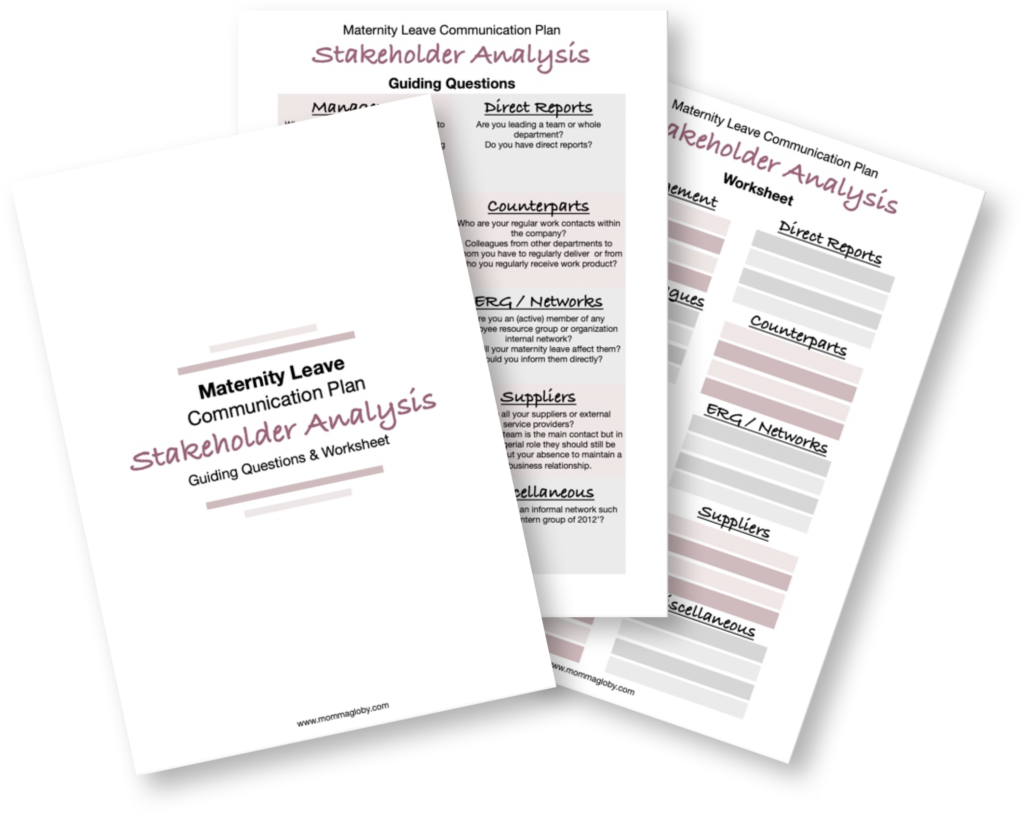A Manager’s View On Maternity Leave Plans
How do you prepare a maternity leave plan that your employer will love? When you look for maternity leave plan guides, templates or recommendations there are many articles and experience reports from the perspective of the momma-to-be. I have yet to find an article from an organization or a manager talking about how they would like mommas-to-be to prepare their maternity leave.
My whole professional career has been in HR and I have been a manager for the last couple of years. Moreover, I have gone on maternity leave twice (as a manager). When preparing my maternity leave I focused on what my management would expect from me as well as what I would expect from my employees. Below you can find my view on maternity leave and its preparation.
When I talk about ‘my view’, I mean my ‘work-self’ view. Over the years, I have established a bit of a ‘work-self’ next to myself. Myself made a diaper cake for a team member going on maternity leave knowing her for less than 6 months and really only talking to her at work. My ‘work-self’, shaped by the male dominated organization culture I have been in for a long time is now giving you this post.
Your Employer And You
If you want to prepare a maternity leave plan that your employer loves, let’s look at who your employer is and what you are to them. Your employer is your organization or company in the wider sense and your direct supervisor or manager in a direct sense.
Your Organization
The primary goal of any business is to maximize profits for its owners, shareholders or partners. To prepare a maternity leave plan that your employer will love, keep this in mind. More importantly, think about the effect your maternity leave has on this goal.
Your Manager
Your manager’s main goal (at its most basic level) is to contribute to the company’s goal of maximizing profits. How does a manager do that?
When I was preparing for my management assessment center I came across Fredmund Malik and his book “Managing Performing Living: Effective Management for a New World”. It was published in 2003 so it is not the newest and I am sure there are better management books out there by now. What I appreciated in his book though is his description of any managers’ tasks regardless of industry, function and company.
So, what are the tasks of a manager? (Tasks of Effective Management)
- Managing Objectives
- Organizing
- Decision-Making
- Supervising
- Developing People
Other tasks of a manager that come to my mind from my experience with regards to a maternity leave are the following:
- Structure work
- Delegate tasks
- Decrease costs
- Increase efficiencies
If you want to prepare a maternity leave plan that your manager will love, think about what your maternity leave absence means from the perspective of your manager/direct supervisor and the tasks they have to perform.
You
As an employee your goal is also to maximize profits for your organization as well. Be that as the lead engineer, the marketing professional or the accountant. When you google “to employ” it says ‘give work to (someone) and pay them for it.’ You are a resource to provide a certain work product or perform a service and you receive money for it in return. In its simplest sense.

What does this mean for your maternity leave plan?
When you go on maternity leave you will be absent from work. You will not be able to provide the work product or service as usual to your organization. Your company and your manager will lose the resource to provide a certain work product or service for a certain time period.
Can the work wait until you’re back? In most cases the work cannot wait 3 months (standard period of maternity leave in most countries), at least not all of it. Therefore your maternity leave creates a problem for your supervisor and organization.
From the organization’s perspective the work has to be continued to not risk the overall goal of maximizing profits. From your manager’s perspective it means they have to organize a replacement for you as a resource to ensure the successful continuation of business.
Organizing a replacement, possibly restructuring work and re-delegating your tasks to someone else, has not been budgeted for by your manager. It costs extra time and effort while it is not adding any value to the organization or its goal.
Your maternity leave is basically a staffing and communication issue. Your manager has to restructure the tasks, find someone who can be your deputy and delegate your tasks and projects to them. In order for a deputy to take over your tasks they will require handover and might require training or new access rights. Colleagues, customers, clients, suppliers need to be informed so that communication chains remain intact and business can continue smoothly.
None of these activities are adding any value to the organization or its goal. They are an inefficiency. It takes everyone affected by it away from their core, value-adding tasks at least for a moment.
A maternity leave plan your manager will love is therefore a plan that disrupts daily operations as little as possible. The more you can prepare your maternity leave as such, the better. Don’t present your manager with an issue but with a solu
Well, let’s say facilitate the solution depending on your manager and their personality. Some might be happy if you bring the complete solution in one meeting, others want to be part of the solution finding and feel you’re overstepping if you’re too forward with your proposal. Have a proposal for anything that can come up ready but be mindful of how you communicate it.

How to prepare a successful maternity leave plan?
To create a maternity leave plan that your employer will love, address the following points:
- From when to when will you be on leave?
- Providing clarity on your maternity leave dates is the first step. Don’t just dump your absence dates on your manager and expect them to do the rest though. As a responsible committed employee and professional you should consider the following aspects and prepare them as much as you possibly can, too.
- How will your work be done while you’re out?
- Who is a possible deputy? Do they have all that’s necessary to take over your work and tasks? Do they need training, access rights, etc. Organizing (resources and tasks) is your manager’s task. With regards to your maternity leave this task was not planned for by your manager. Therefore, the more you can prepare this and bring a proposal, the more your manager will appreciate it. While you might provide the idea of who can take over, it might be your manager to communicate it to this person. In case new access rights are needed, would your manager have to request it? Find out all details and then inform your manager pro-actively.
- How will you organize the actual handover to the deputy?
- Any handover of tasks will require some time. Keep this in mind as you plan your maternity leave. How much time will be required to bring a deputy up to speed? If you need e.g. 8 hours, would you and the deputy be able to sit down for a) a complete day, b) for about an hour every day for two weeks or c) do one hour per week starting 2 months before your leave? As a professional this is something you should be able to handle without your manager but align it with them as you are taking up the deputy’s time that they would usually spend on other tasks.
- Who needs to be informed about your absence and the deputy to ensure smooth business continuation?
- Depending on the stakeholders and culture, it might be necessary for the manager to inform about your absence and who will fill in. Keep this in mind as you offer to handle all of the communication. If your manager needs to communicate, write the email for them or plan the meeting.
- Related: 7 Best Tips to Communicate your Pregnancy and Maternity Leave To Your Employer
Don’t Miss Anyone!
Get the Maternity Leave Communication Plan Stakeholder Analysis Workbook to prepare your maternity leave like a boss from the beginning. With 20 guiding questions and a worksheet you will not miss anyone who needs to be informed!

- What are important, critical, problematic up-coming events during your leave that your manager should know about?
- Why? How do they impact your work? You will hand over the tasks and work to a deputy and they should handle it in the same way as you. Nevertheless, your manager has the task of supervising and decision-making. You can support them by highlighting important topics coming up which everyone should keep an eye on.
- How will you return?
- Depending on your companies’ policies part-time work or job sharing might be possibilities. Discuss your options and ideas with your manager before you leave. Figure out until when you have to make the final decision on your return.
- How will you communicate while you are out?
- Discuss with your manager if and how you will communicate while you are on maternity leave. Will you reach out after the baby is born? Can they contact you? Will you only get in touch shortly before coming back?
All of the above should come at minimal effort not only to your manager but also to any other stakeholders (team mates, colleagues, counterparts or customers).
The above is how I prepared both of my maternity leaves. When I returned the first time I did not hear any complaints from the team, our management, our customers, or anyone else but received praises on how smooth the transition both to my deputy as well as back to me had been.
As a manager now myself the above is the kind of preparation I’d expect from an employee going on maternity leave. Of course, depending on the seniority of the employee the expectations are adjusted and I step in more or less as needed. I would want the employee to align the decisions on deputy, handover plan etc. with me and then keep me informed of the progress.
Preparing your maternity leave plan can be a great opportunity to show your management capabilities. As you propose how to organize the work, how to manage the projects while you’re out, who can take over you work, you can demonstrate many qualities that managers need to have. It can also be an opportunity to review aspects of your work and whether they can be automated, reduced in e.g. frequency or completely removed.
Conclusion
A maternity leave plan that your employer loves considers the interests of your employer, i.e. your organization and your manager. It is a plan that does not disrupt business and allows for smooth business continuation at minimal preparation efforts for everyone affected by it.






